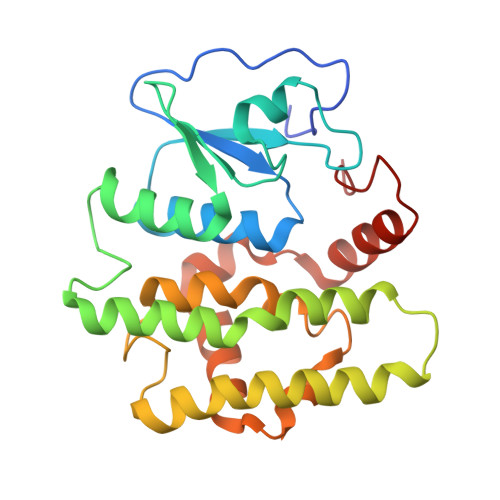Mechanistic evaluation and transcriptional signature of a glutathione S-transferase omega 1 inhibitor.
Ramkumar, K., Samanta, S., Kyani, A., Yang, S., Tamura, S., Ziemke, E., Stuckey, J.A., Li, S., Chinnaswamy, K., Otake, H., Debnath, B., Yarovenko, V., Sebolt-Leopold, J.S., Ljungman, M., Neamati, N.(2016) Nat Commun 7: 13084-13084
- PubMed: 27703239
- DOI: https://doi.org/10.1038/ncomms13084
- Primary Citation of Related Structures:
4YQM, 4YQU, 4YQV - PubMed Abstract:
Glutathione S-transferase omega 1 (GSTO1) is an atypical GST isoform that is overexpressed in several cancers and has been implicated in drug resistance. Currently, no small-molecule drug targeting GSTO1 is under clinical development. Here we show that silencing of GSTO1 with siRNA significantly impairs cancer cell viability, validating GSTO1 as a potential new target in oncology. We report on the development and characterization of a series of chloroacetamide-containing potent GSTO1 inhibitors. Co-crystal structures of GSTO1 with our inhibitors demonstrate covalent binding to the active site cysteine. These potent GSTO1 inhibitors suppress cancer cell growth, enhance the cytotoxic effects of cisplatin and inhibit tumour growth in colon cancer models as single agent. Bru-seq-based transcription profiling unravelled novel roles for GSTO1 in cholesterol metabolism, oxidative and endoplasmic stress responses, cytoskeleton and cell migration. Our findings demonstrate the therapeutic utility of GSTO1 inhibitors as anticancer agents and identify the novel cellular pathways under GSTO1 regulation in colorectal cancer.
Organizational Affiliation:
Department of Pharmacology and Pharmaceutical Sciences, School of Pharmacy, University of Southern California, 1985 Zonal Avenue, Los Angeles, California 90033, USA.
















